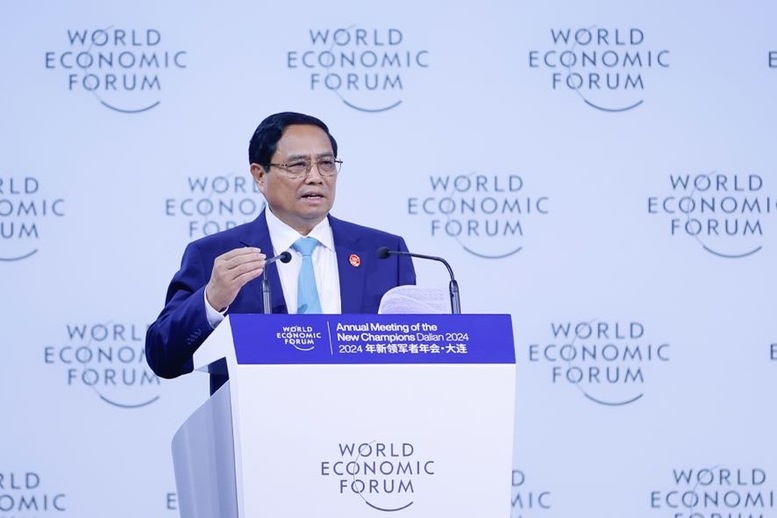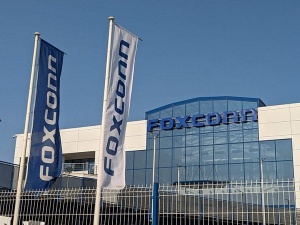Vietnam's PM assures no energy shortages in 2024 at WEF discussion
 |
During the discussion, participants praised Vietnam's impressive growth and improving business and investment environment. Notably, the digital economy accounted for approximately 16 per cent of GDP in 2023.
PM Chinh emphasised the importance of "harmonised interests and shared risks" and the "three together" spirit between businesses, the state, and the people: "Together listen and understand; together share vision and action; together work, enjoy, win, and develop."
Professor Schwab expressed the WEF's pleasure in maintaining a close cooperative relationship with Vietnam, describing the country as a "rising star" in the global economy.
Brand Cheng, chairman and CEO of Foxconn, reported to PM Chinh about the establishment of a new factory in Vietnam, which began production in April. This move exemplifies Vietnam's determination to foster economic development. To date, Foxconn's factories span five provinces, employing 80,000 workers with a total investment of approximately $4 billion.
"Vietnam is developing rapidly, and we are growing alongside it," Cheng affirmed.
In his remarks, PM Chinh reviewed current global conditions, including the lingering effects of the COVID-19 pandemic, geopolitical conflicts, strategic competition, and climate change impacts on the global economy.
In this context, Vietnam prioritises growth while implementing measures to control inflation, stabilise the macroeconomy, and ensure major economic balances, he said.
Looking ahead, PM Chinh emphasised that Vietnam will continue to prioritise growth through major policy initiatives. These include proactive, flexible, and effective monetary policies, such as lowering lending rates, as well as tax, fee, and charge reductions and deferrals, and boosting public investment. Vietnam will also focus on three strategic breakthroughs: institutional reforms, infrastructure development, and human resources. Notably, institutional reforms are viewed as both a resource and a driver for development.
PM Chinh highlighted the importance of developing both hard infrastructure (transport, healthcare, education, digital transition infrastructure) and soft infrastructure.
"In the current context, Vietnam continues to prioritise growth with flexible policies tailored to our conditions and global trends," he asserted.
He also called on investors to continue partnering with Vietnam in achieving growth targets while maintaining macroeconomic stability, controlling inflation, ensuring major economic balances, social welfare, and improving people's living standards.
He also addressed investor concerns, particularly regarding electricity supply. While there were localised electricity shortages in 2023, the PM assured that despite a 15 per cent increase in electricity consumption in 2024 - reaching over 1 billion kWh on peak days - Vietnam's power supply will be stable.
PM Chinh affirmed, "Vietnam will not lack electricity," citing comprehensive solutions in power generation, transmission, distribution, utilisation, and pricing. For instance, the construction of 500kV transmission lines, which used to take two to four years, now only takes about six months.
Vietnam is actively transitioning to clean energy, with the government refining its institutional framework and policies. Upcoming decrees will include mechanisms for direct power purchase agreements, self-produced and self-consumed rooftop solar power, and the development of natural gas and LNG-fired power projects.
 | Foxconn to pour $383 million into Bac Ninh factory Apple's main supplier, Foxconn, will invest $383.3 million into a new factory specialising in producing printed circuit boards (PCB) in Bac Ninh province. |
What the stars mean:
★ Poor ★ ★ Promising ★★★ Good ★★★★ Very good ★★★★★ Exceptional
Related Contents
Latest News
More News
- Gia Lai draws over $1bn in new investment so far this year (January 19, 2026 | 11:50)
- Unlocking capital flows for strategic and suitable projects (January 18, 2026 | 09:00)
- ACV begins cargo terminal construction at Danang Airport (January 17, 2026 | 15:57)
- Viettel starts construction of semiconductor chip production plant (January 16, 2026 | 21:30)
- Bel expands Vietnam production with $19.7 million investment (January 16, 2026 | 16:07)
- ASML signals long-term commitment to Vietnam (January 16, 2026 | 12:00)
- Ho Chi Minh City starts construction of four key infrastructure projects (January 15, 2026 | 17:22)
- PIDG invests with AquaOne to expand Xuan Mai’s treated water supply to Hanoi (January 15, 2026 | 11:16)
- Vietnam ranks 38th in global AI adoption (January 14, 2026 | 16:01)
- European business confidence reaches highest in seven years (January 13, 2026 | 10:17)

 Tag:
Tag:


















 Mobile Version
Mobile Version